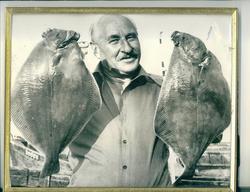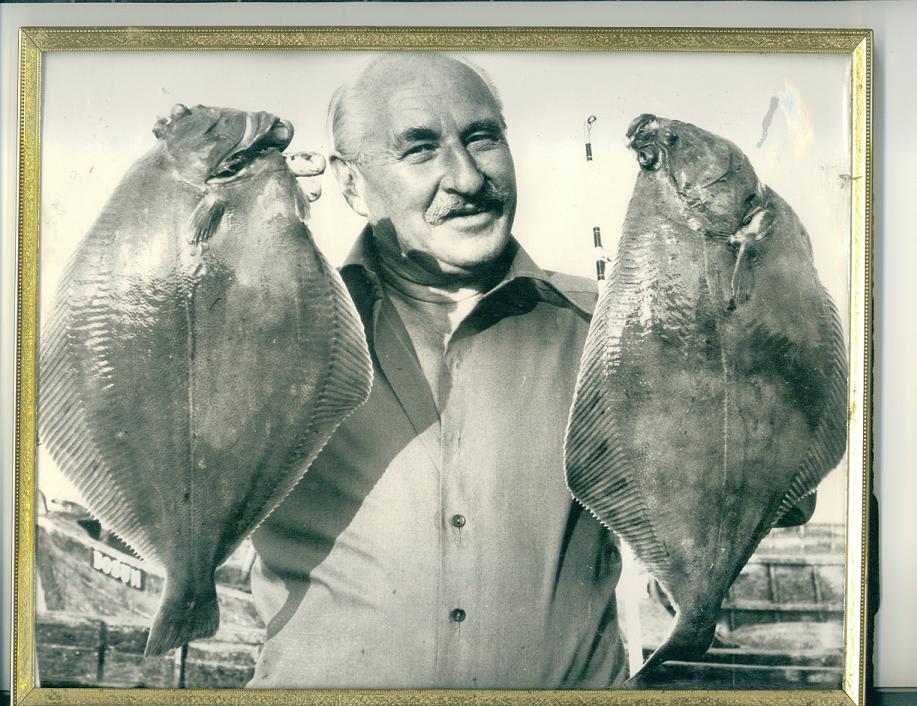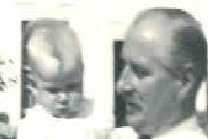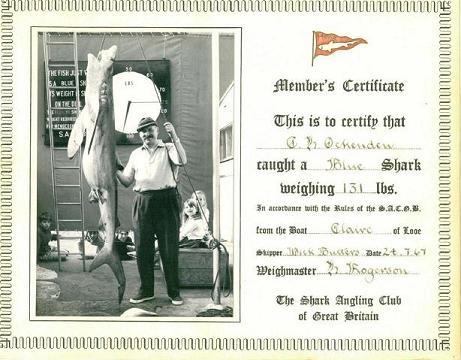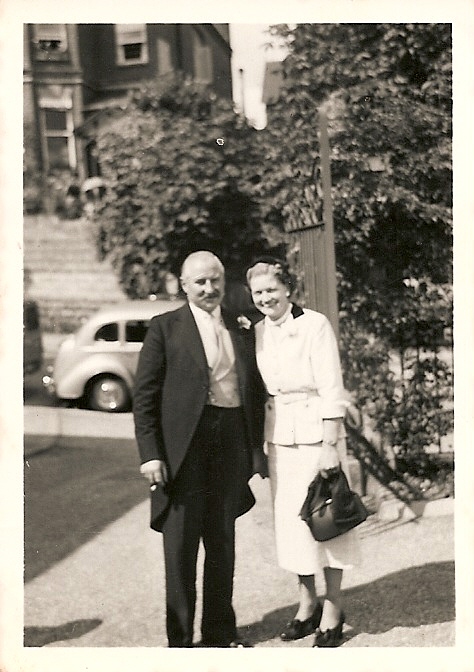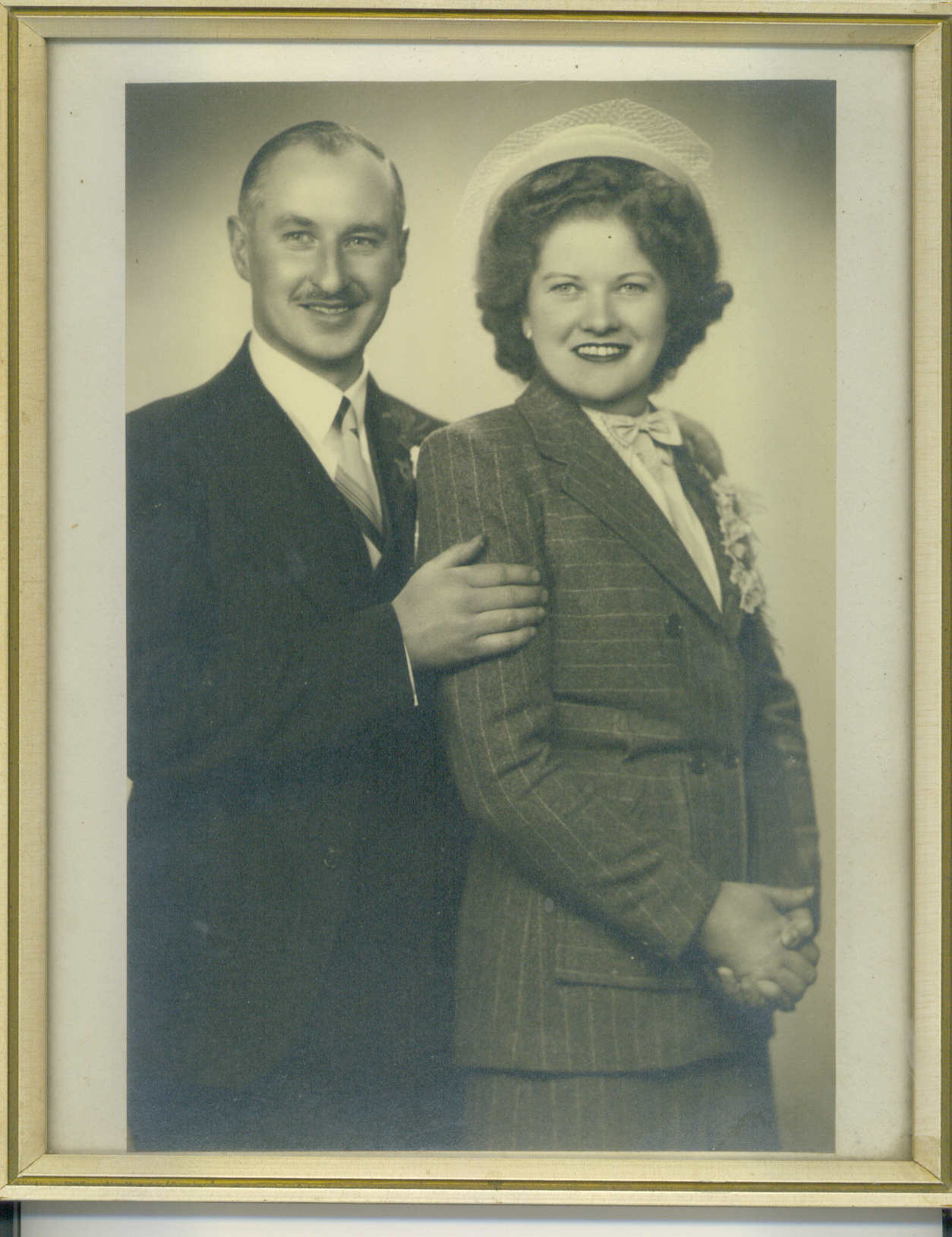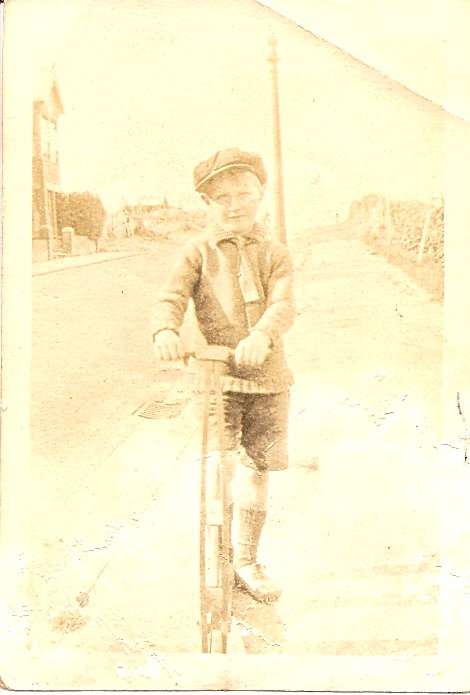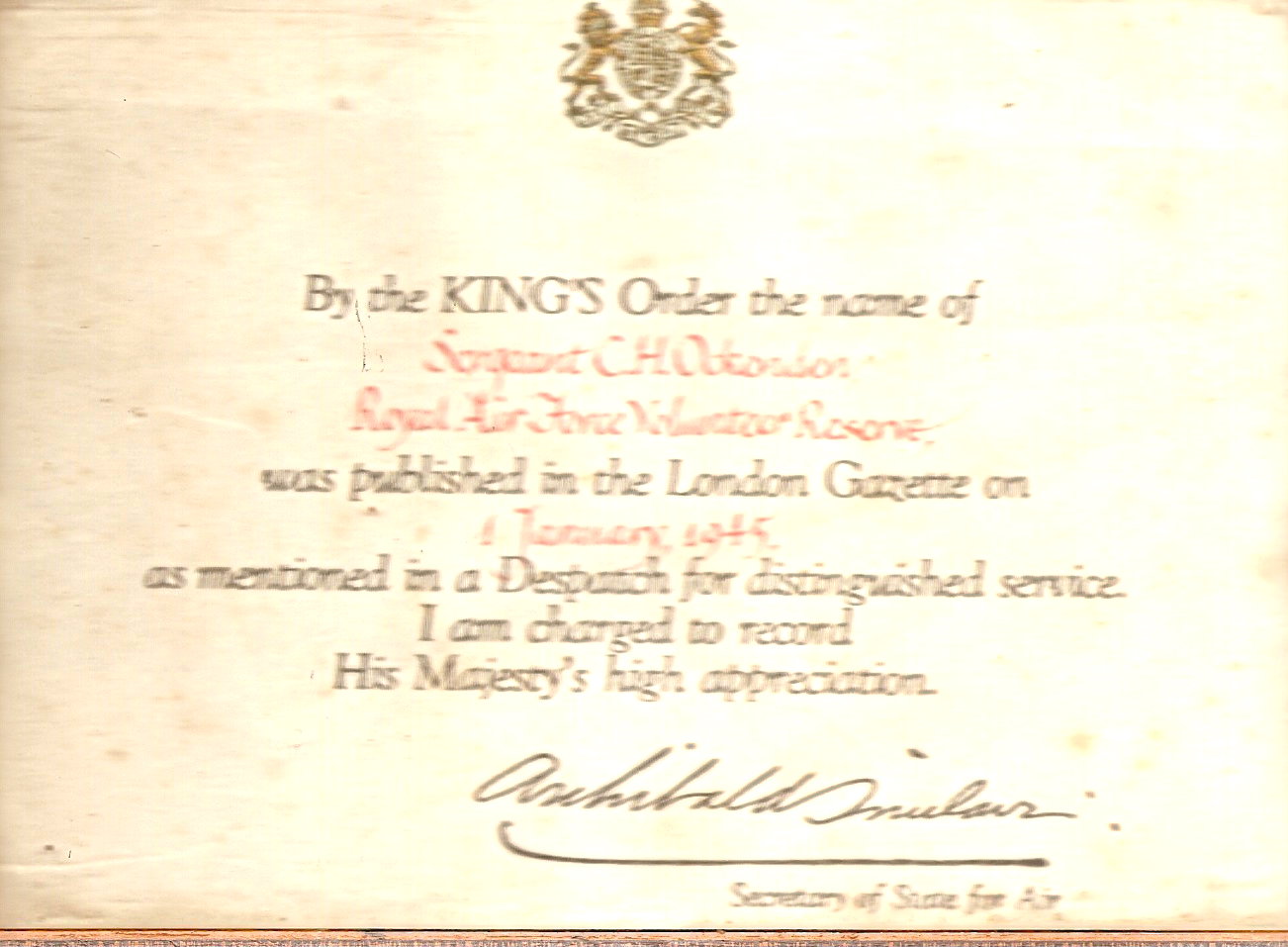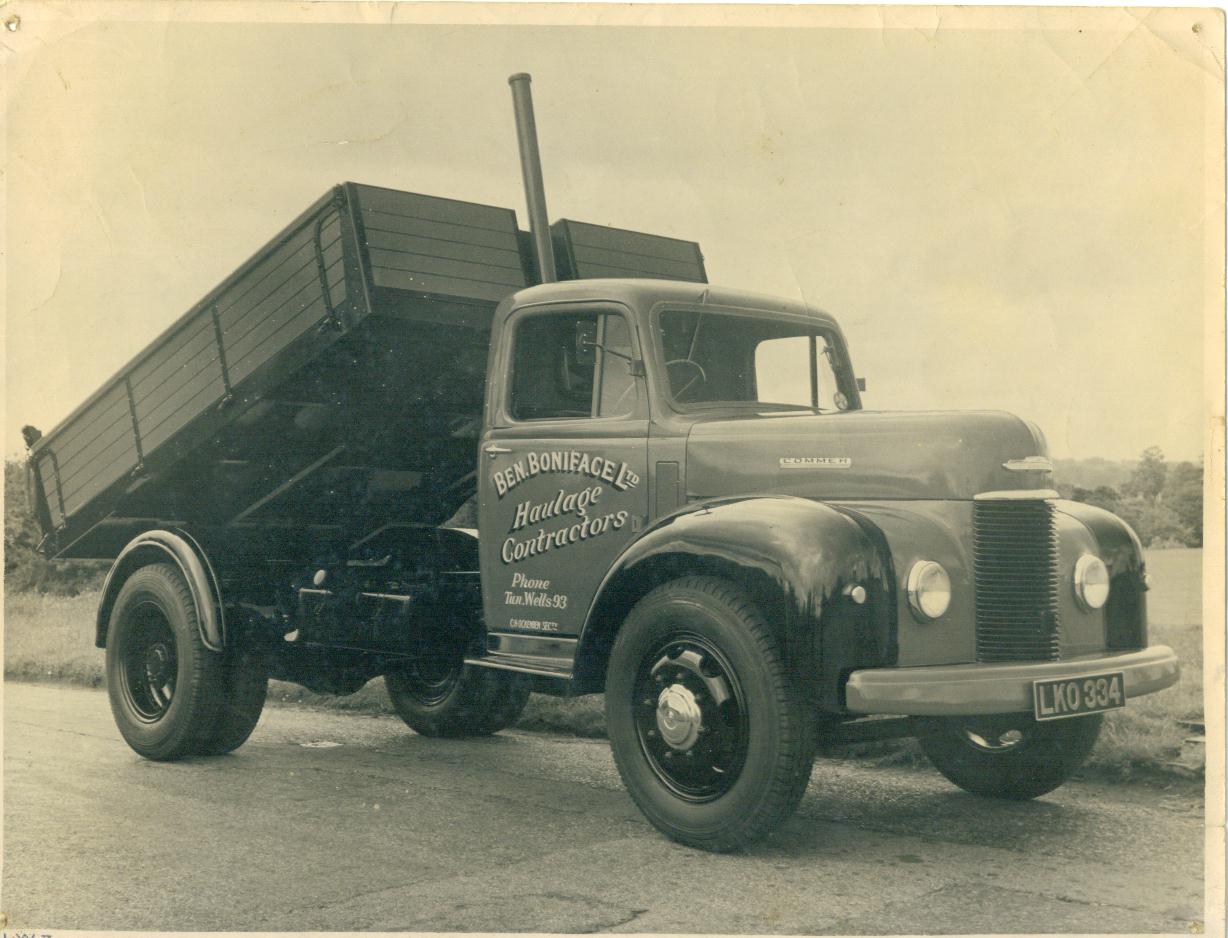He was the second child, and only son, of Charles Henry Ockenden (1885-1971) and Sarah Pyle (1881-1972)
His older sister was Olive Ethel (1909-2003)
He grew up in Ninfield, and Sidley, near Bexhill on sea, East Sussex.
When his parents took over the George Hotel, in Hurst Green, he was sent off to boarding school, Bethenay House, Goudhurst, Kent. Here he excelled in music, art & swimming.
In 1928 he was awarded "The Royal Life Saving Society" award of merit, a silver medal in a red case.
On leaving school, he joined Shell Mex & BP, working in London, Southampton & Jersey.
He was learning to fly, in Jersey, when WW2 began, and he signed up for the RAF.
He was a Flight Sargent, but after being horrificly burned from the waist down, he was grounded for the remainder of the war, and looked after the fuel supplies for both the British Airforce & the American Airforce. (He always told my brother & I, that if this had not happened, we probably would never have been born!)
On 1st January 1945, he is mentioned in dispatches. (He saved a fellow pilot from a burning libity bus, hence his own wounds)
It was whilst he was recovering from his injuries, that he first laid his eyes on my Mother.
The story goes, that as he lay in his hospital bed, he could see out of the window, between his raised legs, and watch the WRAF girls doing their PE exercises.
Hence he would say that the first time he ever saw my Mother, she was in her knickers!
At the end of the war, he was offered his officer commission. But he declined, left the RAF and went into business with his Father.
Their fist joint venture being Ben Boniface Ltd, a haulage firm, run from offices and yard at the Sussex Shades, Tunbridge Wells, Kent.
As the business grew, they later moved to Benhall Mill Road, Tunbridge Wells, Kent.
Here he also started T.W.Slatter & Son, Aglome Ltd, and Kent & Sussex Wrought Iron Ltd.
He married the love of his life, Daisy Florence Musk (1921-2007) on 13th March 1948, at Crowborough, Sussex.
They made their home in Falcome Road, Tunbridge Wells.
A year later on 13th March 1949, their son Michael Charles was born. (Upsetting his parents who had wanted their Grandson to be the 4th generation of Charles Henry's)
In 1953 they moved to St John's Road, Southborough, Tunbridge Wells. Two years later I was born. (Christine k/a Chris)
In 1963, we moved to Benhall Mill Road, before he took early semi retirement and we moved to Bexhill on sea, East Sussex, in 1972.
My Father loved to drive, walks on the beach and meeting people. But his greatest passion was sea fishing! Fishing was his way of unwinding!
He loved going deep sea fishing, and won the Shark Angling Club of UK, Sussex trophy for one of his many catches. His biggest shark was a 131lb, blue shark, off Looe, Cornwall.
In 1981, he got the flu, but never recovered. It was so unusual for him to be unwell, or quiet!
Tests in early July 1981, at the Royal Marsden Hospital, London, showed he was suffering with cancer.
He came home and a week later, he died at home, at 16:05, 13th July 1981.
He had seen all his friends to say goodbye, and arranged his own funeral. He was a very brave man!
After his cremation, I carried out a week later his dying wish, by scattering his ashes at sea, off St Leonards on sea, Sussex, (11 August 1981), from his boat, Claire.
Survived by wife Daisy, daughter & son.
***********************************************************
He never got to meet his Grandchildren.
He always knew he would die young, he just had this feeling! So he crammed as much as he could into his life. His only regret, he never got to see America!
He is my guardian angel, and has often visited me when I am at my most vunerable, and needed lifting!
He left a huge black hole in my life, which has never totally healed.
As someone once told me,
"No one ever dies, as long as they are talked about!"
Hence my children, refer to him as Gang-gang, and its as if he's still around........he's just off at sea fishing!!!
**********************************************************
Dad loved all sports, his favouite being Rugby Union.
I loved football, and my team was Manchester United.
Dad took me to see them for the first time on 26th December 1968, at Highbury, London, verses Arsenal. We lost 2 - 0, & from that day onwards Arsenal became his team.
But I have always stayed true to my first loves, UNITED!!!
I also enjoyed Rugby League, with my team being St Helens. Dad just had to be different & supported Wigan!
But my first love is still United & you will often see me leaving my Dad reminders of this, although what he would have made of todays modern game I do not know!!!
Now I take my children to see United play, its not just a way of life, some would say its a religion.
**********************************************************
Its amazing how memories happen. When I was little my Father used to sing ditties to me.
"K-K-K-Katy" was a popular World War I-era song written by Geoffrey O'Hara in 1917 and published in 1918. The sheet music advertised it as "The Sensational Stammering Song Success Sung by the Soldiers and Sailors," reflecting a time when speech impediments could be poked fun at—albeit gentle fun in this case. The song tells the story of Jimmy, a young soldier "brave and bold," who stuttered when he tried to speak to girls. Finally he managed to talk to Katy, the "maid with hair of gold." The chorus is what he spoke:
"K-K-K-Katy, beautiful Katy,
You're the only g-g-g-girl that I adore;
When the m-m-m-moon shines,
Over the cowshed,
I'll be waiting at the k-k-k-kitchen door."
Another was,,,
"Constantinople
C-O-N-S-T-A-N-T-I-N-O-P-L-E
Constantinople
It's as easy to sing it as saying you A B C's
C-O-N-S-T-A-N-T-I-N-O-P-L-E
Show your pluck now try your luck
And sing it loud with me
Constantinople
C-O-N-S-T-A-N-T-I-N-O-P-L-E
Constantinople
C-O-N-S-T-A-N-T-I-N-O-P-L-E"
I was a very bad speller at school - except for this word!!!
I have just found another one of his ditties;
"Mairzy doats and dozy doats and liddle lamzy divey
A kiddley divey too, wouldn't you?
If the words sound queer and funny to your ear,
a little bit jumbled and jivey,
Sing "Mares eat oats and does eat oats and little lambs eat ivy."
Mairzy doats and dozy doats and liddle lamzy divey
A kid'll eat ivy too, wouldn't you?"
Mairzy Doats is a novelty song composed in 1943 by Milton Drake, Al Hoffman and Jerry Livingston. It was first played on radio station WOR, New York, by Al Trace and his Silly Symphonists. The song made the pop charts several times, with a version by the Merry Macs reaching No. 1 in March 1944. In addition to its success on the home front, it was also a hit with American servicemen overseas, who allegedly used its nonsensical lyrics as passwords.
At first glance the song's refrain, as written on the sheet music, seems to be meaningless:
Mairzy doats and dozy doats and liddle lamzy divey
A kiddley divey too, wouldn't you?
....(sung with colloquial pronunciation "wooden chew?")
However, the lyrics of the bridge provide a clue:
If the words sound queer and funny to your ear, a little bit jumbled and jivey,
Sing "Mares eat oats and does eat oats and little lambs eat ivy."
With this aid, the refrain is quite easily comprehended, and the ear will detect the hidden message of the final line:
"A kid'll eat ivy too, wouldn't you?"
Thank you dear Dad for such wonderful memories!!!!
********************************************************
REMBERANCE DAY - 11th hour,
of the 11th day of the 11th month.
Remembrance Day – also known as Poppy Day, Armistice Day (the event it commemorates) or Veterans Day – is a day to commemorate the sacrifices of members of the armed forces and of civilians in times of war, specifically since the First World War. It is observed on 11 November to recall the end of World War I on that date in 1918. (Major hostilities of World War I were formally ended at the 11th hour of the 11th day of the 11th month of 1918 with the German signing of the Armistice.) The day was specifically dedicated by King George V, on 7 November 1919, to the observance of members of the armed forces who were killed during war; this was possibly done upon the suggestion of Edward George Honey to Wellesley Tudor Pole, who established two ceremonial periods of remembrance based on events in 1917.
In the United Kingdom, although two minutes of silence are observed on 11 November itself, the main observance is on the second Sunday of November, Remembrance Sunday. Ceremonies are held at local war memorials, usually organised by local branches of the Royal British Legion – an association for ex-servicemen. Typically, poppy wreaths are laid by representatives of the Crown, the armed forces, and local civic leaders, as well as by local organisations including ex-servicemen organisations, cadet forces, the Scouts, Guides, Boys' Brigade, St John Ambulance and the Salvation Army. The start and end of the silence is often also marked by the firing of a cannon. A minute's or two minutes' silence is also frequently incorporated into church services, and even everyday locations such as supermarkets and banks may invite their customers and staff to fall silent at 11:00 am.
The main national commemoration is held at Whitehall, in Central London, for dignitaries, the public, and ceremonial detachments from the armed forces and civilian uniformed services such as the Merchant Navy, Her Majesty's Coastguard, etc. Members of the British Royal Family walk through the Foreign and Commonwealth Office towards the Cenotaph, assembling to the right of the monument to wait for Big Ben to strike 11:00 am, and for the King's Troop, Royal Horse Artillery at Horse Guards Parade, to fire the cannon marking the commencement of the two minutes of silence. Following this, "Last Post" is sounded by the buglers of the Royal Marines. "The Rouse" is then sounded by the trumpeters of the Royal Air Force, after which, to "Beethoven's Funeral March" (composed by Johann Heinrich Walch), wreaths are laid by attendees in the following order: the Queen; senior members of the Royal Family attending in military uniform; the Prime Minister; the leaders of the major political parties from all parts of the United Kingdom; Commonwealth High Commissioners to London, on behalf of their respective nations; the Foreign Secretary, on behalf of the British Dependencies; the Chief of the Defence Staff; the First Sea Lord; the Chief of the General Staff; the Chief of the Air Staff; representatives of the merchant navy and Fishing Fleets and the merchant air service. Junior members of the Royal Family usually watch the service from the balcony of the Foreign Office. The service is generally conducted by the Bishop of London, with a choir from the Chapels Royal, in the presence of representatives of all major faiths in the United Kingdom. Before the marching commences, the members of the Royal Family and public sing the national anthem before the Royal Delegation lead out after the main service.
Members of the Reserve Forces and cadet organisations join in with the marching, alongside volunteers from St John Ambulance, paramedics from the London Ambulance Service, and conflict veterans from World War II, the Falklands, Kosovo, Bosnia, Northern Ireland, other past conflicts, and the ongoing conflicts in Afghanistan and Iraq. After the service, there is a parade of veterans, who also lay wreaths at the foot of the Cenotaph as they pass, and a salute is taken by a member of the Royal Family at Horse Guards Parade.
My Father used to attend each year, with his best friend,
Major Frank Turner. Together they marched past the Cenotaph remembering all their friends, who gave their lives, for our tomorrows.
My Father always said
"Remember the dead, but do not forget the living"
By this he meant those who live on with the scars of war, (depression, blindness, loss of limbs, disfigerment)
and their families, who have lost loved ones.
~~~~~~~~~~~~~
They shall grow not old, as we that are left grow old:
Age shall not weary them, nor the years condemn.
At the going down of the sun and in the morning,
We will remember them.
~~~~~~~~~~~~~
***********************************************************
You cannot see me or touch me
But I'm standing next to you
Your tears will only hurt me,
Your sadness makes me blue,
Be brave, and show a smiling face
Let not your grief shine through,
I love you from a different place,
Yet I'm standing next to you.
***********************************************************
~~~~~~~TO MY DAD~~~~~~~
It broke my heart to lose you,
But you did not go alone
Part of me went with you,
the day God called you home.
A million times I've thought of you
A million times I've cryed
If loving could have saved you
You would have never died
Forgive me Lord, I'll always weep
For the Dad I loved but could not keep.
***********************************************************
To Dad,
A Fathers touch,
a Daddy's kiss,
a grieving Daughter,
You're greatly missed.
An empty house,
an empty chair,
a fathers love,
no longer there.
A broken heart,
tear filled eyes,
another soul
to fill the sky.
Many memories in my mind,
some I laugh, some I cry.
The times we shared, the laughs we had,
things I miss when I think of you Dad.
Realizing that's all I have to hold on to,
only memories, of what once was you.
Missing your laugh,
I will never again hear.
That is the reality
that fills me with so much fear.
No more smile on your face,
no more warmth of your embrace.
The last hug,
the last kiss,
the last "goodbye"
leaves me with one last wish ...
To have you Dad, here today,
never to leave your Daughter this way.
A Father's touch,
a Daddy's kiss,
a grieving Daughter,
YOU'RE GREATLY MISSED!
I love you, Dad. ~Kris x~
[Many thanks to Jean for sharing this poem for our Dad's]
***********************************************************
A VERY SPECIAL THANK YOU TO JEAN,
"Bluejean Blessed with memories"
FOR SPONSORING THIS MEMORIAL FOR MY FATHER.
YOU ARE SO WONDERFUL FOR DOING THIS.
***********************************************************
.
He was the second child, and only son, of Charles Henry Ockenden (1885-1971) and Sarah Pyle (1881-1972)
His older sister was Olive Ethel (1909-2003)
He grew up in Ninfield, and Sidley, near Bexhill on sea, East Sussex.
When his parents took over the George Hotel, in Hurst Green, he was sent off to boarding school, Bethenay House, Goudhurst, Kent. Here he excelled in music, art & swimming.
In 1928 he was awarded "The Royal Life Saving Society" award of merit, a silver medal in a red case.
On leaving school, he joined Shell Mex & BP, working in London, Southampton & Jersey.
He was learning to fly, in Jersey, when WW2 began, and he signed up for the RAF.
He was a Flight Sargent, but after being horrificly burned from the waist down, he was grounded for the remainder of the war, and looked after the fuel supplies for both the British Airforce & the American Airforce. (He always told my brother & I, that if this had not happened, we probably would never have been born!)
On 1st January 1945, he is mentioned in dispatches. (He saved a fellow pilot from a burning libity bus, hence his own wounds)
It was whilst he was recovering from his injuries, that he first laid his eyes on my Mother.
The story goes, that as he lay in his hospital bed, he could see out of the window, between his raised legs, and watch the WRAF girls doing their PE exercises.
Hence he would say that the first time he ever saw my Mother, she was in her knickers!
At the end of the war, he was offered his officer commission. But he declined, left the RAF and went into business with his Father.
Their fist joint venture being Ben Boniface Ltd, a haulage firm, run from offices and yard at the Sussex Shades, Tunbridge Wells, Kent.
As the business grew, they later moved to Benhall Mill Road, Tunbridge Wells, Kent.
Here he also started T.W.Slatter & Son, Aglome Ltd, and Kent & Sussex Wrought Iron Ltd.
He married the love of his life, Daisy Florence Musk (1921-2007) on 13th March 1948, at Crowborough, Sussex.
They made their home in Falcome Road, Tunbridge Wells.
A year later on 13th March 1949, their son Michael Charles was born. (Upsetting his parents who had wanted their Grandson to be the 4th generation of Charles Henry's)
In 1953 they moved to St John's Road, Southborough, Tunbridge Wells. Two years later I was born. (Christine k/a Chris)
In 1963, we moved to Benhall Mill Road, before he took early semi retirement and we moved to Bexhill on sea, East Sussex, in 1972.
My Father loved to drive, walks on the beach and meeting people. But his greatest passion was sea fishing! Fishing was his way of unwinding!
He loved going deep sea fishing, and won the Shark Angling Club of UK, Sussex trophy for one of his many catches. His biggest shark was a 131lb, blue shark, off Looe, Cornwall.
In 1981, he got the flu, but never recovered. It was so unusual for him to be unwell, or quiet!
Tests in early July 1981, at the Royal Marsden Hospital, London, showed he was suffering with cancer.
He came home and a week later, he died at home, at 16:05, 13th July 1981.
He had seen all his friends to say goodbye, and arranged his own funeral. He was a very brave man!
After his cremation, I carried out a week later his dying wish, by scattering his ashes at sea, off St Leonards on sea, Sussex, (11 August 1981), from his boat, Claire.
Survived by wife Daisy, daughter & son.
***********************************************************
He never got to meet his Grandchildren.
He always knew he would die young, he just had this feeling! So he crammed as much as he could into his life. His only regret, he never got to see America!
He is my guardian angel, and has often visited me when I am at my most vunerable, and needed lifting!
He left a huge black hole in my life, which has never totally healed.
As someone once told me,
"No one ever dies, as long as they are talked about!"
Hence my children, refer to him as Gang-gang, and its as if he's still around........he's just off at sea fishing!!!
**********************************************************
Dad loved all sports, his favouite being Rugby Union.
I loved football, and my team was Manchester United.
Dad took me to see them for the first time on 26th December 1968, at Highbury, London, verses Arsenal. We lost 2 - 0, & from that day onwards Arsenal became his team.
But I have always stayed true to my first loves, UNITED!!!
I also enjoyed Rugby League, with my team being St Helens. Dad just had to be different & supported Wigan!
But my first love is still United & you will often see me leaving my Dad reminders of this, although what he would have made of todays modern game I do not know!!!
Now I take my children to see United play, its not just a way of life, some would say its a religion.
**********************************************************
Its amazing how memories happen. When I was little my Father used to sing ditties to me.
"K-K-K-Katy" was a popular World War I-era song written by Geoffrey O'Hara in 1917 and published in 1918. The sheet music advertised it as "The Sensational Stammering Song Success Sung by the Soldiers and Sailors," reflecting a time when speech impediments could be poked fun at—albeit gentle fun in this case. The song tells the story of Jimmy, a young soldier "brave and bold," who stuttered when he tried to speak to girls. Finally he managed to talk to Katy, the "maid with hair of gold." The chorus is what he spoke:
"K-K-K-Katy, beautiful Katy,
You're the only g-g-g-girl that I adore;
When the m-m-m-moon shines,
Over the cowshed,
I'll be waiting at the k-k-k-kitchen door."
Another was,,,
"Constantinople
C-O-N-S-T-A-N-T-I-N-O-P-L-E
Constantinople
It's as easy to sing it as saying you A B C's
C-O-N-S-T-A-N-T-I-N-O-P-L-E
Show your pluck now try your luck
And sing it loud with me
Constantinople
C-O-N-S-T-A-N-T-I-N-O-P-L-E
Constantinople
C-O-N-S-T-A-N-T-I-N-O-P-L-E"
I was a very bad speller at school - except for this word!!!
I have just found another one of his ditties;
"Mairzy doats and dozy doats and liddle lamzy divey
A kiddley divey too, wouldn't you?
If the words sound queer and funny to your ear,
a little bit jumbled and jivey,
Sing "Mares eat oats and does eat oats and little lambs eat ivy."
Mairzy doats and dozy doats and liddle lamzy divey
A kid'll eat ivy too, wouldn't you?"
Mairzy Doats is a novelty song composed in 1943 by Milton Drake, Al Hoffman and Jerry Livingston. It was first played on radio station WOR, New York, by Al Trace and his Silly Symphonists. The song made the pop charts several times, with a version by the Merry Macs reaching No. 1 in March 1944. In addition to its success on the home front, it was also a hit with American servicemen overseas, who allegedly used its nonsensical lyrics as passwords.
At first glance the song's refrain, as written on the sheet music, seems to be meaningless:
Mairzy doats and dozy doats and liddle lamzy divey
A kiddley divey too, wouldn't you?
....(sung with colloquial pronunciation "wooden chew?")
However, the lyrics of the bridge provide a clue:
If the words sound queer and funny to your ear, a little bit jumbled and jivey,
Sing "Mares eat oats and does eat oats and little lambs eat ivy."
With this aid, the refrain is quite easily comprehended, and the ear will detect the hidden message of the final line:
"A kid'll eat ivy too, wouldn't you?"
Thank you dear Dad for such wonderful memories!!!!
********************************************************
REMBERANCE DAY - 11th hour,
of the 11th day of the 11th month.
Remembrance Day – also known as Poppy Day, Armistice Day (the event it commemorates) or Veterans Day – is a day to commemorate the sacrifices of members of the armed forces and of civilians in times of war, specifically since the First World War. It is observed on 11 November to recall the end of World War I on that date in 1918. (Major hostilities of World War I were formally ended at the 11th hour of the 11th day of the 11th month of 1918 with the German signing of the Armistice.) The day was specifically dedicated by King George V, on 7 November 1919, to the observance of members of the armed forces who were killed during war; this was possibly done upon the suggestion of Edward George Honey to Wellesley Tudor Pole, who established two ceremonial periods of remembrance based on events in 1917.
In the United Kingdom, although two minutes of silence are observed on 11 November itself, the main observance is on the second Sunday of November, Remembrance Sunday. Ceremonies are held at local war memorials, usually organised by local branches of the Royal British Legion – an association for ex-servicemen. Typically, poppy wreaths are laid by representatives of the Crown, the armed forces, and local civic leaders, as well as by local organisations including ex-servicemen organisations, cadet forces, the Scouts, Guides, Boys' Brigade, St John Ambulance and the Salvation Army. The start and end of the silence is often also marked by the firing of a cannon. A minute's or two minutes' silence is also frequently incorporated into church services, and even everyday locations such as supermarkets and banks may invite their customers and staff to fall silent at 11:00 am.
The main national commemoration is held at Whitehall, in Central London, for dignitaries, the public, and ceremonial detachments from the armed forces and civilian uniformed services such as the Merchant Navy, Her Majesty's Coastguard, etc. Members of the British Royal Family walk through the Foreign and Commonwealth Office towards the Cenotaph, assembling to the right of the monument to wait for Big Ben to strike 11:00 am, and for the King's Troop, Royal Horse Artillery at Horse Guards Parade, to fire the cannon marking the commencement of the two minutes of silence. Following this, "Last Post" is sounded by the buglers of the Royal Marines. "The Rouse" is then sounded by the trumpeters of the Royal Air Force, after which, to "Beethoven's Funeral March" (composed by Johann Heinrich Walch), wreaths are laid by attendees in the following order: the Queen; senior members of the Royal Family attending in military uniform; the Prime Minister; the leaders of the major political parties from all parts of the United Kingdom; Commonwealth High Commissioners to London, on behalf of their respective nations; the Foreign Secretary, on behalf of the British Dependencies; the Chief of the Defence Staff; the First Sea Lord; the Chief of the General Staff; the Chief of the Air Staff; representatives of the merchant navy and Fishing Fleets and the merchant air service. Junior members of the Royal Family usually watch the service from the balcony of the Foreign Office. The service is generally conducted by the Bishop of London, with a choir from the Chapels Royal, in the presence of representatives of all major faiths in the United Kingdom. Before the marching commences, the members of the Royal Family and public sing the national anthem before the Royal Delegation lead out after the main service.
Members of the Reserve Forces and cadet organisations join in with the marching, alongside volunteers from St John Ambulance, paramedics from the London Ambulance Service, and conflict veterans from World War II, the Falklands, Kosovo, Bosnia, Northern Ireland, other past conflicts, and the ongoing conflicts in Afghanistan and Iraq. After the service, there is a parade of veterans, who also lay wreaths at the foot of the Cenotaph as they pass, and a salute is taken by a member of the Royal Family at Horse Guards Parade.
My Father used to attend each year, with his best friend,
Major Frank Turner. Together they marched past the Cenotaph remembering all their friends, who gave their lives, for our tomorrows.
My Father always said
"Remember the dead, but do not forget the living"
By this he meant those who live on with the scars of war, (depression, blindness, loss of limbs, disfigerment)
and their families, who have lost loved ones.
~~~~~~~~~~~~~
They shall grow not old, as we that are left grow old:
Age shall not weary them, nor the years condemn.
At the going down of the sun and in the morning,
We will remember them.
~~~~~~~~~~~~~
***********************************************************
You cannot see me or touch me
But I'm standing next to you
Your tears will only hurt me,
Your sadness makes me blue,
Be brave, and show a smiling face
Let not your grief shine through,
I love you from a different place,
Yet I'm standing next to you.
***********************************************************
~~~~~~~TO MY DAD~~~~~~~
It broke my heart to lose you,
But you did not go alone
Part of me went with you,
the day God called you home.
A million times I've thought of you
A million times I've cryed
If loving could have saved you
You would have never died
Forgive me Lord, I'll always weep
For the Dad I loved but could not keep.
***********************************************************
To Dad,
A Fathers touch,
a Daddy's kiss,
a grieving Daughter,
You're greatly missed.
An empty house,
an empty chair,
a fathers love,
no longer there.
A broken heart,
tear filled eyes,
another soul
to fill the sky.
Many memories in my mind,
some I laugh, some I cry.
The times we shared, the laughs we had,
things I miss when I think of you Dad.
Realizing that's all I have to hold on to,
only memories, of what once was you.
Missing your laugh,
I will never again hear.
That is the reality
that fills me with so much fear.
No more smile on your face,
no more warmth of your embrace.
The last hug,
the last kiss,
the last "goodbye"
leaves me with one last wish ...
To have you Dad, here today,
never to leave your Daughter this way.
A Father's touch,
a Daddy's kiss,
a grieving Daughter,
YOU'RE GREATLY MISSED!
I love you, Dad. ~Kris x~
[Many thanks to Jean for sharing this poem for our Dad's]
***********************************************************
A VERY SPECIAL THANK YOU TO JEAN,
"Bluejean Blessed with memories"
FOR SPONSORING THIS MEMORIAL FOR MY FATHER.
YOU ARE SO WONDERFUL FOR DOING THIS.
***********************************************************
.
